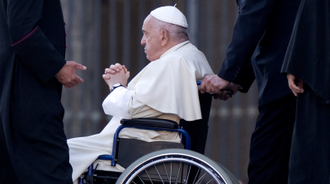Synod's Final Document has Magisterial value

Image: Vatican Media
Source: Vatican News
A press conference was held on Saturday evening 26 October, to discuss the Synod's Final Document. Synod leaders pointed to the need to shift the language and perspective with which we understand the Church. Moving away from a vision of the universal Church as a kind of multinational corporation, the Church is instead to be seen as a "communion of Churches," with growing contributions from laypersons and women. The ongoing question of female diaconate also remains open.
The press briefing featured key Synod leaders, including the Prefect of the Dicastery for Communication, Paolo Ruffini, Cardinal Mario Grech, and Cardinal Jean-Claude Hollerich.
The Final Document is currently only available in the original Italian. Other language versions will be available soon.
Magisterial value
The first question posed pertained to the Pope's choice not to issue a post-synodal exhortation and what this means for the future of papal documents.
Theologian Mgr Riccardo Battocchio explained that the Pope's stance is in line with Episcopalis communio, indicating that if the Pope expressly approves it, the document is part of his magisterium-not as a binding norm, but as a set of guiding principles.
Cardinal Mario Grech added that the Synod itself was a powerful, beautiful experience of dialogue and communion.
Cardinal Jean-Claude Hollerich, SJ, observed that this year, as the synodal method took root, differing perspectives were approached with openness, bringing true synodality to life.
The Church as a communion, not a corporation
The Final Document calls for a new approach, no longer viewing the Church as a corporation with branches but as a communion of Churches. The term "universal Church" is reframed to emphasise unity within diversity, seeing local Churches not as subordinate levels but as unique expressions of faith within a single Body of Christ.
As Mgr Battocchio clarified, the document's non-normative nature does not lessen its impact but points the way toward a united journey marked by plurality, a journey reflective of the Church's origins. This vision calls the Church to conversion-not only moral but relational-encouraging deeper, more diverse ecclesial relationships.
Rooted and on pilgrimage
Responding to questions on respecting Eastern liturgical traditions amid migration, Father Giacomo Costa, SJ, pointed to the Church's mission to remain "rooted and pilgrim."
He emphasised the importance of upholding these rich traditions without retreating into isolationism.
Rediscovering the treasures of the Eastern Churches was a major highlight, he said.
Sister Maria de los Dolores Palencia Gómez spoke of her experience ministering to a diverse congregation in Mexico, where, she noted, a blend of over 30 nationalities enriches the faith.
Father Costa also underscored that while the Latin Church is a significant part of the Catholic Church, it does not encompass its entirety. This diversity, he added, is an asset, requiring preservation but not rigidity, as it showcases the varied ways faith has taken root across cultures. "The Church should serve as a hub where people of different backgrounds find unity as brothers and sisters, children of one Father," Fr Costa stated.
Lay and ordained ministries are complimentary
Referring to paragraph 76 of the Final Document, the press conference highlighted that lay and ordained ministries should not be seen in opposition but as complementary services within the Church.
Lay ministers are not "fill-ins" for priests, but contributors to a shared mission, particularly in secularized regions where the Church embraces a community-based rather than hierarchical structure.
Cardinal Hollerich noted that the liturgy remains open to adaptation, enabling greater participation where appropriate. In his diocese, for example, he frequently celebrates Mass in Portuguese, using a Brazilian missal that encourages broader congregational involvement. The Sunday Eucharist, he emphasised, serves as a focal point for building Gospel-centered communities.
The open question of female deacons
A remaining open issue is the potential for female diaconate. Monsignor Battocchio explained that in many seminaries, women already play a significant role in the formation of ministers, with lay families and women actively participating in training efforts.
Cardinal Grech spoke of a recent experience from a European seminary where a lay couple contributed to the formation program, a practice already present in many Latin American dioceses.
Cardinal Hollerich acknowledged that this is a "very delicate issue" and noted that the Pope has neither confirmed nor dismissed the possibility, keeping it an open question for further discernment.
The future of study groups
The Synod's ten 'study groups' are scheduled to conclude their work by June.
Father Costa indicated that the results are expected to be referred back to the Episcopal Conferences represented in the Synod, in keeping with the Pope's intent to foster an extended period of discernment, giving more time for reflection rather than rushing decisions.


















